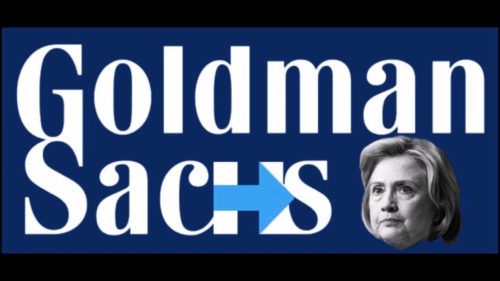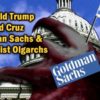Commentary by Dr. Patrick Slattery — The the great blood-sucking vampire squid known as Goldman Sachs has issued a directive to its hundreds of partners and top employees NOT to donate to the Donald Trump campaign. Goldman Sachs was the largest corporate contributor to both the Obama and Romney campaigns in the last presidential election. The Clintons married off their only child, Chelsea, to a Goldman Sachs banker, and we know that Hillary has received (not through her campaign, but personally) exorbitant speaking fees for 40-minute talks to the bank’s board, with the contents of the speeches kept secret.

By the way, former Goldman Sachs officials have shown up at the top of government financial regulators around the world. How convenient for them. Here is a partial list from Wikipedia.
U.S. Secretaries of Treasury
Henry H. Fowler – Former United States Secretary of the Treasury (1965–1969)
Henry Paulson – Former United States Secretary of the Treasury (2006–2009)
Robert Rubin – Former Secretary of the Treasury of the United States, ex–Chairman of Citigroup
Lawrence Summers – Secretary of the Treasury of the United States (1999–2001)[8]
Other U.S. regulatory officials
William C. Dudley – President of the Federal Reserve Bank of New York
Gary Gensler – Chairman of the U.S. Commodity Futures Trading Commission (2009– )
Arthur Levitt – Chairman of the Securities and Exchange Commission (1993–2001)[5]
R. Scott Morris – Former CEO of Boston Options Exchange
Gene Sperling – Director of the National Economic Council (2011–)[7]
Reuben Jeffery III – Under Secretary of State for Economic, Business, and Agricultural Affairs (2007– )
Neel Kashkari – Former Interim Assistant Secretary of the Treasury for Financial Stability (2008–2009)
Robert Zoellick – United States Trade Representative (2001–2005), Deputy Secretary of State (2005–2006), World Bank President (2007–2012)
Joshua Bolten – Former White House Chief of Staff
Rahm Emanuel – Former White House Chief of Staff, Mayor of Chicago (2011–)[4]
Jon Corzine – Former CEO of MF Global, Inc., former Democratic Governor (2006–2010) and U.S. Senator (2001–2006), New Jersey
Judd Gregg – Governor of New Hampshire (1989–1993) and United States Senator from New Hampshire (1993–2011)
George Herbert Walker IV – Managing director at Neuberger Berman and member of the Bush family
Foreign central bankers
Mario Draghi – President of the European Central Bank (2011-)
Mark Carney – Governor of the Bank of England (2013–) and former Governor of the Bank of Canada (2008–2013)[3]
Ian Macfarlane – Governor of the Reserve Bank of Australia (1996–2006)
Tito Mboweni – Governor of the Reserve Bank of South Africa (1999–2009)
Other Foreign finacial leaders
Malcolm Turnbull – Prime Minister of Australia (2015- )
Romano Prodi – Prime Minister of Italy (1996–1998, 2006–2008) and President of the European Commission (1999–2004)[6]
Olusegun Olutoyin Aganga – Former Nigerian Finance Minister, current Nigerian Minister for Trade and Investments
Erik Åsbrink – Minister for Finance of Sweden (1996–1999)
Ziad Bahaa-Eldin – Deputy Prime Minister of Egypt (2013–)
Petros Christodoulou – General Manager of the Public Debt Management Agency of Greece (2010–2012) and Deputy Chief Executive Officer of the National Bank of Greece (2012–)
Guillermo de la Dehesa – Secretary of State of Economy and Finance of Spain (1986–1988)
Vladimír Dlouhý – Minister of Industry and Trade of the Czech Republic (1992–1997)
Of course, Trump wouldn’t want their filthy bribe money anyway. And now for the article from Fortune magazine on Goldman Sachs banning Trump donations:
Goldman Sachs Bans Employees from Donating to Trump
Goldman Sachs has enacted a set of rules that bans the firm’s top employees from contributing to certain campaigns, including the Trump-Pence ticket.
The rules kicked in Sept. 1 and will apply only to partners of the firm. The memo detailing the rule change was first reported by Politico. The firm says the rules were meant to remove any implication of so-called “pay to play.” Four years ago, the bank paid $12 million to settle charges that a former Boston-based banker had picked up bond underwriting business in the state while working for and contributing funds to the campaign of a then Massachusetts state treasurer and governor-hopeful, Tim Cahill.
But the people in the Trump campaign are sure to question the timing. That’s because the rules ban donations to politicians running for state or local offices, as well as donations to state officials who are seeking federal office. That makes campaign contributions to the Trump-Pence ticket a no-no. Pence is the current governor of Indiana.
In the memo, a copy of which was obtained by Fortune, Goldman specifically mentions the Trump-Pence campaign as an example of one Goldman partners can no longer support. Among the type of donations that are banned, according to the memo, are, “Any federal candidate who is a sitting state or local official (e.g., governor running for president or vice president, such as the Trump/Pence ticket, or mayor running for Congress), including their Political Action Committees (PACs).”
At the same time, the rules do not restrict donations to Clinton-Kaine. Kaine is a U.S. Senator for Virginia, and not considered a local official under Goldman’s rules. Although the memo does say that Goldman partners are no longer able to donate to the Virginia Democratic party, which could be a reference to Kaine. Lloyd Blankfein, Goldman’s CEO, has declined to say who he is supporting for president, but is known as a long-time Clinton supporter. Blankfein donated to Clinton when she ran against Obama is 2008.
Goldman declined to comment on this story.
“The policy change is also meant to minimize potential reputational damage caused by any false perception that the firm is attempting to circumvent pay-to-play rules, particularly given partners’ seniority and visibility,” the firm wrote in the memo. “All failures to pre-clear political activities as outlined below are taken seriously and violations may result in disciplinary action.”
Fortune in July reported that SEC rules would make it nearly impossible for the Trump-Pence campaign to raise money from private equity managers, citing pay-to-play rules.
The ban doesn’t eliminate a large number of potential Trump donors. The bank has 467 partners globally, out of 30,000 plus employees. But since Goldman partners tend to be some of the wealthiest people in finance, the fact that they aren’t allowed to send money to the Trump campaign could make a difference, particularly among the race for Wall Street dollars, where Trump has been trailing Clinton but catching up lately.
What’s more, both of the campaign finance directors—Steven Mnuchin for Trump and Gary Gensler for Clinton—are former Goldman bankers. You would expect both to turn to former colleagues for donations.
All of the bank’s employees are already required seek approval from the firm regarding any campaign contributions.
Pay-to-play rules were first introduced by the Securities and Exchange Commission in 2010, after several investment advisors were accused of trying to win business, such as managing public pensions, with improper tactics including political contributions. If a financial advisor were to make a campaign contribution to a public official or candidate, they would be banned from providing advisory services for compensation to the government client for two years under the rules.
Here is the full text of the memo:
From: Global Compliance
Sent: Monday, August 29, 2016 11:57 AM
To: ‘All Partners’
Subject: New Policy on US Political Activities by “Restricted Persons”
Global Compliance
August 29, 2016
New Policy on US Political Activities by “Restricted Persons”
You are receiving this e-mail because effective Thursday, September 1, all partners across the firm are considered “Restricted Persons” as defined by the firm’s Policy on Personal Political Activities in the US. As outlined below, Restricted Persons are prohibited from engaging in political activities and/or making campaign contributions to candidates running for state and local offices, as well as sitting state and local officials running for federal office.
The policy change is meant to prevent inadvertently violating pay-to-play rules, particularly the look-back provision, when partners transition into roles covered by these rules. The penalties for failing to comply with these rules can be severe and include fines and a ban on the firm from doing business with government clients in a particular jurisdiction for a period of at least two years.
The policy change is also meant to minimize potential reputational damage caused by any false perception that the firm is attempting to circumvent pay-to-play rules, particularly given partners’ seniority and visibility. All failures to pre-clear political activities as outlined below are taken seriously and violations may result in disciplinary action.
Highlights of the policy as it applies to you as a Restricted Person are as follows:
All Political Activities Require Pre-Clearance
Like all firm personnel, you must pre-clear all politicalactivities through the US Political Contributions Pre-Clearance System. A pre-clearance requirement applies to all contributions and solicitations, as well as to attending or hosting events; lending your name to lists, letters or invitations; serving on committees; and volunteering with campaigns and elections. Each contribution or political activity must be separately approved, even if you have received prior approvals for the same political campaign.
Prohibition on State, Local and Certain Federal Political Activities
As a Restricted Person, you may not make any contributions or solicit in connection with:
- Any federal candidate who is a sitting state or local official (e.g., governor running for president or vice president, such as the Trump/Pence ticket, or mayor running for Congress), including their Political Action Committees (PACs).
- Any state or local candidate or official in any state or locality (e.g., candidate for governor, mayor, state treasurer, state comptroller, state legislator, local city council).
- State and local party committees (e.g., the Democratic Party of Virginia, the Suffolk County Republican Party).
- PACs and Super PACs supporting or opposing one or more state or local candidates.
- Inaugural/Transition Committees or expenses for newly elected state and local officials.
- Bond ballot initiative committees (e.g., a committee seeking authorization to issue municipal securities to fund a public infrastructure project).
Contact Government Interactions Compliance or Government Affairs Legal if you have any questions about these restrictions.





